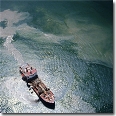
Emergency Responders Participate in Oil Spill Training
Federal, state, and local emergency responders began gathering at the Coast Guard Sector in Miami Beach yesterday for an intense three-day training course focusing on coastal oil spills and aftermath shoreline impact assessments. During the workshop, participants--including responders from the U.S. Coast Guard and Florida's Department of Environmental Protection--are learning about coastal environments and how to properly cleanup and restore them following a spill. The training's two field classes are taking place today and tomorrow, designed to guide participants through proper survey and response methods.
"Spill response is a top priority, and this specialized training enhances the multi-mission preparedness of today's Coast Guard personnel, as well as our federal, state, and local partners," said Lieutenant Commander Mario Mercado, Chief of Sector Miami's Port Operations Division. "Prevention through education and the rigorous enforcement of existing environmental protection regulations is the cornerstone in reducing the likelihood of pollution into Florida's fragile marine and estuarine habitats; however, we must remain ever vigilant to respond quickly in the event of a spill."
The course is being conducted by the National Oceanic and Atmospheric Administration and will feature sessions by Dr. Jacqueline Michel, Dr. Miles Hayes, Brad Benggio, and others who are part of NOAA's Scientific Support Team for oil spill response. This team of scientists has worldwide oil spill response experience, including the Valdez oil spill in Alaska, the grounding of the New Carissa off the Oregon coast, the Prestige off the coast of Spain, and the 1993 Tampa Bay Oil Spill.
"Rapid response and shoreline assessments provide essential protection of our coastal communities," said Phil Wieczynski, Chief of DEP's Bureau of Emergency Response. "Properly surveying the affected areas allows responders to maximize the recovery of oiled habitats and resources while minimizing environmental impacts." Along Florida's shores, salt marshes and mangrove forests provide important habitats to numerous species. The $53 billion tourism industry contributes 700,000 jobs to Florida, while recreational and commercial fishing activities inject $6.6 billion into Florida communities annually, according to DEP.